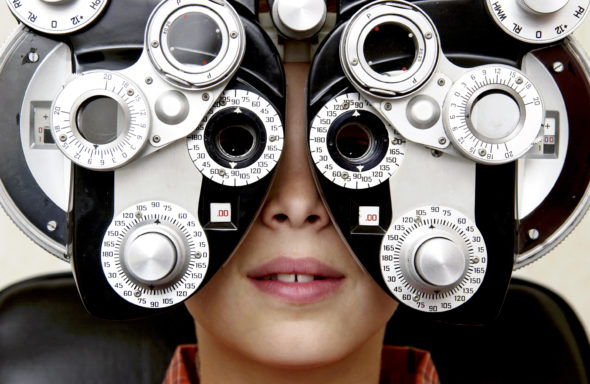
What to Expect During an Eye Exam
Posted September 12, 2019Regular eye exams help detect eye problems at early stages and alert your doctor to prescription needs. However, we know some people find doctor visits to be scary, or uncomfortable. Especially when we’re getting up close and personal with your eyes!
If you haven’t had an eye exam, or if it’s been some time since your last visit, preparing for this kind of appointment can be nerve-wracking. Never fear: we’re here to tell you exactly what to expect, so you can feel empowered and prepared, and see that it’s not so scary after all.
How to Prepare
Being prepared for your eye exam is the first step to ensure a good appointment. As you get ready to head to the office, remember to bring:
- Your glasses and contact lenses, especially if you would like a new prescription.
- A list of questions, eye health concerns, and any symptoms you may have. If you are seeing a new doctor or are having your first eye exam, be prepared to answer questions about your vision history.
- Any current medications you are taking, including over-the-counter drugs and eye drops.
- Sunglasses and a friend or family member. Most appointments involve diluting your pupils, which can cause a sensitivity to light and make driving difficult.
Call ahead and ask about insurance before your appointment. Knowing the options for payment before you come in will save you a lot of hassle. Your doctor’s office can also give you the approximate cost of your exam (usually between $50 and $100).
The Actual Appointment
Set aside thirty minutes to an hour for your eye exam. During your appointment, the doctors and nurses will walk you through some basic tests to evaluate different aspects of your eye health:
- Visual Acuity Test – read large and small letters in order to determine the vision level in each eye compared to a standard 20/20.
- Refraction Test and Retinoscopy – if you don’t have perfect eyesight, these two tests allow the optometrist to determine if you are nearsighted or farsighted and to approximate the best lens description.
- Keratometry Test – measures the shape and curve of the outside of your eye – the cornea – which affects how you see light. Improper shape of the cornea can result in astigmatism.
- Peripheral Visual Field Test – allows your doctor to evaluate how much you can see out of the corners of your eyes.
- Intraocular Pressure Measurement – tests for glaucoma.
- Retinal Examination – eye drops will be administered so your doctor can check on the health of your retina.
Throughout the appointment, your eye doctor or nurse will explain each test and what you need to do. Let them know if you have any questions or concerns. We are there for you throughout the exam.
Tying Loose Ends
After the exam, your doctor will discuss the test results with you and help you understand your vision assessment. If you need glasses or contacts, they will give you a prescription and answer any questions you have. If you choose to purchase eyewear or corrective lenses, another appointment will be scheduled in which you will be assisted in choosing glasses and in learning how to wear and care for your contacts.
Eye exams don’t need to be a stressful part of your year. With the proper planning, they can go smoothly and even be enjoyable! Schedule your next appointment at our Christiansburg or Salem locations. We are happy to answer any and all of your questions.
